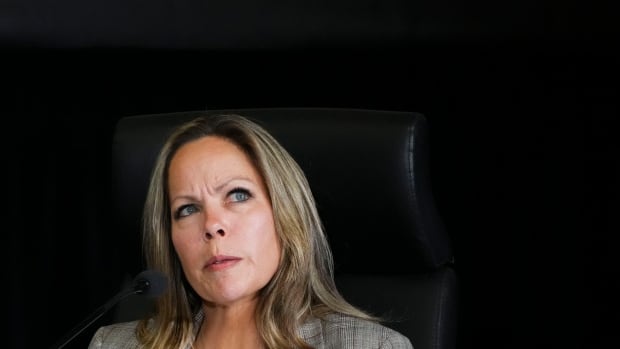A lawyer for the Ottawa Police Service accused Tamara Lich, one of the most recognizable faces of the anti COVID-19 restriction convoy protest, of having a selective memory of how events unfolded last winter, during a tense moment of cross-examination Friday morning.
Lich is appearing before the Public Order Emergency Commission, which is reviewing the federal government’s decision to invoke the never-before-used Emergencies Act to clear the crowds and vehicles which had blocked parts of Ottawa’s downtown for three weeks.
David Migicovsky pushed back on a claim Lich made Thursday under oath that nobody told her that they needed to leave after the Emergencies Act was invoked on Feb. 14. He showed her a police log, saying a police liaison team (PLT) had told demonstrators they needed to leave and met with Lich and other organizers on Feb. 16.
“PLT advised them to depart and message this out to others,” said the log.
“All understood messaging.”
“I remember when they came in, and we had the discussion and as it says, I became very upset,” said Lich
“I believe I said something to the effect of, ‘I cannot believe that you’re about to do this to your own people’ …I was crying because of what they were proposing to do to Canadian citizens.”
Lich said she was never told to leave.
“It seems to me your memory is selective,” said Migicovsky. “When I take you to something that implicates you, you have no memory.”
Lich’s lawyer Brendan Miller objected, calling the comments inflammatory.
“That’s not a proper question,” said an audibly frustrated Miller.
“I’ll move on,” said Migicovsky
Lich said she was alarmed with vaccine mandates
Lich told the inquiry late Thursday that she joined the “Freedom Convoy” after failing to get a response from members of Parliament she emailed about ending COVID-19 restrictions.
“I was growing increasingly alarmed with the mandates and the harm that I was seeing the mandates inflict on Canadians,” she said.
“I heard from people that had lost their jobs and lost everything. I have the tears of thousands of Canadians on my shoulder, who every day told me that we were bringing them hope.”
Lich characterized the protest as peaceful. She testified Friday she was not aware of claims crowds would sometimes swarm police and bylaw officers and was not aware of any death threats levelled against politicians until she began to watch the commission proceedings.
Lich said she also has faced death threats.
A lawyer for the government pointed to an Ontario Provincial Police report that had identified a driver with the blockade who had made inflammatory statements.
“The video also showed him displaying a protective vest, which he claimed would stop an armour-piercing round. He claimed he brought it to protect himself and that he had worn it at the blockade,” said the OPP document.
“OPP field officers have spoken with this male and his truck has been positioned in front of the Chateau Laurier since the beginning of the protest.”
Lich said she was not aware of that incident.
Lich says she didn’t notice honking from hotel
On Thursday Lich said the honking of truck horns, a hallmark of the protests, even became a bit too much for her.
“You know, trying to walk down the street and have a conversation with somebody was sometimes difficult,” she said.
But on Friday, she said she couldn’t hear the truck horns from her downtown hotel room.
“I didn’t really notice it, the horns honking. And I was right downtown.”
WATCH | Lich says she didn’t notice honking horns from hotel room:
Tamara Lich, one of the organizers of the self-described “Freedom Convoy,” was asked about the disruption of honking horns during the truck protest.
Lich took questions under cross-examination from lawyer Paul Champ, who represents a coalition of downtown residents and businesses.
“You wouldn’t want a big rig to pull up, for example, in front of your parents’ home and park and idle for 24 hours a day for several weeks honking their horn,” asked Champ.
Lich responded that her ex-husband was a tool push on a drilling rig.
“I’ve spent many days on the site of a drilling rig and there’s a lot of diesel fumes and there’s a lot of noise,” she said.
“It’s not pleasant is it?” countered Champ.
“It is what it is,” said Lich.
Diagolon founder, ex-RCMP sniper will testify later
Lich and a fellow organizer, Chris Barber, were both arrested the day before hundreds of police officers in tactical gear moved in to remove the protesters from the roads around Parliament Hill in February.
The pair have been accused of mischief, obstructing police, and counselling others to commit mischief and intimidation. Their trial is scheduled for next fall.
Later today the commission will hear from Jeremy MacKenzie, the founder of the online group “Diagolon,” who will testify by video conference from a Saskatchewan prison.
The commission confirmed Thursday that MacKenzie, who is facing charges unrelated to the convoy, will testify publicly despite his bid to speak before the inquiry under a publication ban.
Other protesters on the witness list today are Chris Deering, Maggie Hope Braun and Daniel Bulford, a former RCMP officer who was on the prime minister’s security detail and quit after refusing to get vaccinated for COVID-19.



